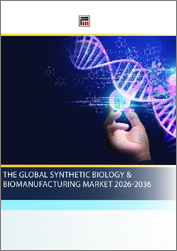
|
시장보고서
상품코드
1611005
차세대 바이오 제조 시장(2024-2031년)Global Next-Generation Biomanufacturing Market 2024-2031 |
||||||
세계의 차세대 바이오 제조 시장 규모, 점유율, 동향 분석 리포트 : 제조 유형별(업스트림 제조, 다운스트림 제조), 제품 유형별(바이오의약품, 백신, 바이오연료, 바이오폴리머, 기타(재조합 단백질, 모노클로널 항체)), 최종사용자별(제약회사, 수탁제조 기관(CMO), 수탁 개발·제조 기관(CDMO)), 기타(바이오테크놀러지 기업, 연구개발·학술기관) 예측 기간별(2024-2031년)
차세대 바이오 제조 시장은 예측 기간(2024-2031년) 동안 연평균 10.4%의 성장률을 보일 것으로 예상됩니다. 차세대 바이오 제조는 의약품, 바이오연료 및 기타 바이오테크놀러지 제품을 포함한 생물학적 제품을 생산하기 위해 첨단 기술과 혁신을 활용하는 첨단 접근 방식을 포함합니다. 또한 바이오의약품에 대한 수요 증가, 산업 발전을 지원하는 규제 환경, 인공지능(AI), 머신러닝(ML), 디지털 기술의 통합으로 인해 이 시장은 향후 큰 성장을 보일 것으로 예상됩니다.
시장 역학
바이오의약품 수요 증가
바이오의약품에 대한 수요 증가는 차세대 바이오 제조 시장의 성장을 크게 촉진할 것으로 예상됩니다. 바이오의약품에는 단클론 항체, 재조합 단백질, 유전자 치료제 등이 포함되며, 암, 자가면역질환, 희귀 유전질환 등 다양한 질병 치료에 중요한 역할을 하고 있습니다. 이러한 질환의 전 세계 유병률 증가는 바이오시밀러 승인 증가와 신약 개발의 발전과 함께 바이오 제조 분야의 확장을 가속화하고 있습니다. 또 다른 혜택으로는 비용 효율성과 효율성을 높이기 위해 기존 제조 공정에 연속 생산 및 일회용 기술과 같은 차세대 솔루션을 적극적으로 통합하고 있으며, 이러한 솔루션들은 종합적으로 시장에 이익을 가져다 줄 것으로 예상됩니다. 예를 들어 유럽제약협회(European Federation of Pharmaceutical Industries and Associations)의 보고서에 따르면 유럽 의약품 시장은 괄목할 만한 성장세를 보이고 있습니다. 이 시장의 생산액은 2020년 3,170억 6,900만 달러에서 2022년 3,713억 4,100만 달러로 14.3% 증가할 것으로 예상됩니다. 또한 2022년 제약회사들은 유럽내 연구개발에 약 486억 800만 달러를 배정할 것으로 예상했습니다.
세포-유전자치료제 상용화
세포 및 유전자 치료의 상용화가 시장 성장을 주도하고 있습니다. 이러한 치료법은 정밀한 유전자 변형과 맞춤형 세포 제조를 포함한 고도로 전문화된 제조 공정이 필요하며, 이는 바이오 제조 기술의 발전과 확장을 촉진하고 있습니다. 또한 이러한 치료법의 좋은 임상 결과와 이 분야에서 기대되는 치료법의 발전으로 인해 발견과 규제 당국의 승인이 증가함에 따라 차세대 바이오 제조 시장의 성장을 더욱 촉진하고 있습니다. 예를 들어 2022년 10월, 제약, 생명공학 및 영양 부문에 서비스를 제공하는 유명한 세계 제조 파트너인 론자(Lonza)는 미국 휴스턴 시설에서 제조된 두 가지 세포 및 유전자 치료제가 2022년 3분기에 추가로 상업적 승인을 받았다고 발표했습니다. 수혈 의존성 베타 지중해빈혈 치료제인 ZYNTEGLO와 활동성 조기 뇌부신백질이영양증 치료제인 SKYSONA는 매사추세츠주 서머빌에 위치한 블루버드 바이오(Bluebird Bio)가 개발했으며, 각각 8월과 9월에 승인을 받았습니다. 이번 승인은 론자의 휴스턴 시설이 촉진한 두 번째와 세 번째 세포 및 유전자 치료제에 대한 상업적 승인입니다.
부문별 전망
- 제조 유형에 따라 시장은 업스트림 제조와 다운스트림 제조로 나뉩니다.
- 제품 유형별로는 바이오의약품, 백신, 바이오연료, 바이오폴리머, 기타(재조합단백질, 모노클로널 항체)로 구분됩니다.
- 최종사용자별로는 제약사, 의약품 제조수탁기관(CMO), 위탁개발 및 제조기관(CDMO), 기타(생명공학기업, 연구기관, 학술기관)로 구분됩니다.
업스트림 제조가 선호되는 제조 유형
업스트림 제조는 세포배양과 생물학적 제제 생산에서 매우 중요한 역할을 하므로 차세대 바이오 제조 시장에서 선호되는 제조 유형입니다. 이 단계에서는 세포주와 바이오리액터의 조건을 최적화해야 하는데, 이는 단백질이나 백신과 같은 고품질의 대규모 생물학적 제제를 생산하기 위해 매우 중요합니다. 또한 바이오리액터 기술의 발전, 배지 제조 방법의 개선, 맞춤형 의료 및 생물학적 제제에 대한 수요 증가 등의 요인이 이 부문의 성장을 주도하고 있습니다.
개발제조수탁기관(CDMO)이 가장 큰 최종사용자
개발 및 제조수탁기관(CDMO)은 차세대 바이오 제조 시장에서 가장 큰 최종사용자입니다. CDMO는 바이오의약품의 개발 및 대량 생산에 있으며, 핵심적인 역할을 수행하며, 새로운 바이오의약품과 첨단 치료제를 효율적으로 시장에 출시하는 데 필수적입니다. 또한 맞춤형 의료에 대한 수요 증가, 확장 가능한 생산 솔루션의 필요성, 바이오의약품의 복잡성 증가가 이 부문의 성장을 주도하고 있습니다.
지역별 전망
세계 차세대 바이오 제조 시장은 북미(미국, 캐나다), 유럽(영국, 이탈리아, 스페인, 독일, 프랑스, 기타 유럽), 아시아태평양(인도, 중국, 일본, 한국, 기타 아시아태평양), 기타 지역(중동 및 아프리카, 중남미) 등 지역별로 세분화되어 있습니다. 세분화됩니다.
북미, 세계 차세대 바이오 제조 시장을 독점할 것으로 전망
북미는 향후 가장 높은 성장률을 보일 것으로 예상되는데, 이는 북미의 첨단 바이오 제조 능력의 지속적인 확대, 바이오 기술 및 바이오 제조 분야에 대한 투자 증가, 강력한 R&D 생태계, 맞춤형 의료에 대한 수요 증가, 지원적인 시장 생태계, 그리고 주요 차세대 바이오 제조 기업 생태계, 그리고 AstraZeneca, Amgen, Genentech 등 주요 차세대 바이오 제조 기업의 존재에 기인합니다. 예를 들어 2022년 9월 백악관이 발표한 팩트시트에는 바이든 대통령의 국가 바이오테크놀러지 및 바이오 제조 구상을 추진하기 위한 실질적인 투자와 구상이 소개되어 있습니다. 그 중에서도 특히 중요한 것은 바이오 제조 역량 강화, 연구개발 촉진, 첨단 제조 시설 설립을 촉진하기 위해 20억 달러가 배정된 것입니다. 이 구상은 국내 바이오 제조 산업을 강화하고, 생명공학 기술 혁신을 촉진하며, 필수 생물학적 제제의 탄탄한 공급망을 확보하는 것을 목표로 합니다. 정부, 산업계, 학계의 협력을 촉진함으로써 미국을 생명공학의 선두주자로 자리매김하고 미래의 건강 위기에 대한 대비를 강화하는 것을 목표로 하고 있습니다.
차세대 바이오 제조 시장에서 급성장하고 있는 아시아태평양
- 인도, 베트남, 중국을 포함한 아시아태평양 국가들은 공공 및 민간 부문을 통해 생명공학 및 바이오 제조 인프라에 대규모 투자를 하고 있으며, 이는 이 지역 시장의 급격한 성장에 박차를 가하고 있습니다.
- 아시아태평양의 만성질환 유병률 증가와 첨단 치료법에 대한 수요 증가로 인해 보다 정교한 바이오 제조 솔루션에 대한 수요가 증가할 것으로 예상됩니다.
세계 차세대 바이오 제조 시장에 진출한 주요 기업으로는 Amgen Inc., AstraZeneca, Genentech, Inc. 등이 있습니다. 시장 참여자들은 제휴, 파트너십, 시장 확대 등의 전략을 통해 성장에 필요한 자본을 투입하는 데 주력하고 있습니다.
최근 동향
- 2023년 11월, 아스트라제네카는 암, 면역, 희귀질환 등 미충족 의료 수요가 높은 주요 분야에서 차세대 치료제 개발을 촉진하기 위해 현재 임상 단계에 있는 생명공학 기업 셀렉티스(Cellectis)와의 제휴 및 투자 계약을 체결하였습니다. 발표했습니다. 이번 계약에 따라 아스트라제네카는 셀렉티스의 독자적인 유전자 편집 기술 및 제조 전문성을 활용하여 혁신적인 세포 및 유전자 치료 제품을 개발함으로써 이 분야에서 확대되고 있는 아스트라제네카의 포트폴리오를 강화할 예정입니다. 또한 이번 계약은 25개의 유전자 타깃을 아스트라제네카에 독점적으로 할당하고, 이 중 최대 10개의 후보 제품을 개발 후보로 검토할 수 있도록 규정하고 있습니다.
목차
제1장 리포트 개요
- 업계의 현황 분석과 성장 가능성 전망
- 조사 방법과 툴
- 시장 내역
- 부문별
- 지역별
제2장 시장 개요와 인사이트
- 조사 범위
- 애널리스트의 인사이트와 현재 시장 동향
- 주요 업계 동향
- 권장사항
- 결론
제3장 경쟁 구도
- 주요 기업 분석
- 개요
- 재무 분석
- SWOT 분석
- 최근 동향
- 주요 전략 분석
제4장 시장 세분화
- 세계의 차세대 바이오 제조 시장 : 제조 유형별
- 업스트림 제조
- 다운스트림 제조
- 세계의 차세대 바이오 제조 시장 : 제품 유형별
- 바이오의약품
- 백신
- 바이오연료
- 바이오폴리머
- 기타(재조합 단백질, 모노클로널 항체)
- 세계의 차세대 바이오 제조 시장 : 최종사용자별
- 제약회사
- 제조 수탁 기관(CMO)
- 개발·제조 수탁 기관(CDMO)
- 기타(바이오테크놀러지 기업, 연구·학술기관)
제5장 지역별 분석
- 북미
- 미국
- 캐나다
- 유럽
- 영국
- 독일
- 이탈리아
- 스페인
- 프랑스
- 기타 유럽
- 아시아태평양
- 중국
- 인도
- 일본
- 한국
- 기타 아시아태평양
- 세계의 기타 지역
- 라틴아메리카
- 중동 및 아프리카
제6장 기업 개요
- Allogene Therapeutics
- Amgen Inc.
- AstraZeneca
- Azenta US, Inc.
- BioMarin
- Bio-Techne
- Boehringer Ingelheim International GmbH.
- Bluebird Bio, Inc.
- BSP Pharmaceuticals S.p.A
- Catalent, Inc.
- Charles River Laboratories
- Genentech, Inc.
- Ginkgo Bioworks, Inc.
- Global Life Sciences Solutions USA LLC
- Jubilant Biosys Ltd.
- KBI Biopharma, Inc.
- Lonza
- NantKwest, Inc.
- Recipharm AB
- Samsung Biologics
- Thermo Fisher Scientific Inc.
- WuXi Biologics Co., Ltd
Global Next-Generation Biomanufacturing Market Size, Share & Trends Analysis Report by Manufacturing Type (Upstream Manufacturing, and Downstream Manufacturing), by Product Type Biopharmaceuticals, Vaccines, Biofuels, Biopolymers, and Others (Recombinant Proteins, Monoclonal Antibodies)), and by End-User (Pharmaceutical Companies, Contract Manufacturing Organizations (CMOs), Contract Development and Manufacturing Organizations (CDMOs), and Others (Biotechnology Companies, Research and Academic Institutions) Forecast Period (2024-2031)
Next-generation biomanufacturing market is anticipated to grow at a CAGR of 10.4% during the forecast period (2024-2031). Next-generation biomanufacturing involves an advanced approach to producing biological products, including pharmaceuticals, biofuels, and other biotechnological products, leveraging cutting-edge technologies and innovation. Further, the market is expected to experience significant growth in the future, attributed to the growing demand for biopharmaceuticals, a supportive regulatory environment for industry development, and the growing integration of AI (Artificial Intelligence), ML (Machine Learning), and digital technologies.
Market Dynamics
Growing Demand for Biopharmaceuticals
The increasing demand for biopharmaceuticals is anticipated to significantly drive the growth of the next-generation biomanufacturing market. Biopharmaceuticals encompass monoclonal antibodies, recombinant proteins, and gene therapies, and play a crucial role in the treatment of various diseases, including cancer, autoimmune disorders, and rare genetic conditions. The increasing prevalence of these diseases worldwide, coupled with a rise in the approval of biosimilars and advancements in drug discovery, is accelerating the expansion of the biomanufacturing sector. Additionally, the market is actively integrating next-generation solutions, such as continuous manufacturing and single-use technologies, into existing production processes to enhance cost-effectiveness and efficiency, which are collectively expected to benefit the market. For instance, as reported by the European Federation of Pharmaceutical Industries and Associations, the pharmaceutical market in Europe is experiencing significant growth. The market's production value has risen from $317,069 million in 2020 to $371,341 million in 2022, reflecting an increase of 14.3%. Furthermore, in 2022, pharmaceutical research firms allocated approximately $48,608 million towards R&D in Europe.
Commercialization of Cell & Gene Therapy
The commercialization of cell and gene therapies is significantly supporting the market growth. These treatments necessitate a highly specialized manufacturing process that involves accurate gene modifications and tailored cell preparations, thereby driving advancements and expansion in biomanufacturing technologies. Additionally, the increasing discovery and regulatory approvals are gaining momentum owing to the favorable clinical outcomes of these therapies and the anticipated therapeutic advancements in the field, which are further propelling growth in the next-generation biomanufacturing market. For instance, in October 2022, Lonza, a prominent global manufacturing partner serving the pharmaceutical, biotech, and nutrition sectors, announced that its two additional cell and gene therapies produced at its Houston facility in the US have achieved commercial approval in the third quarter of 2022. ZYNTEGLO, designed for the treatment of transfusion-dependent beta-thalassemia, and SKYSONA, intended for the treatment of early, active cerebral adrenoleukodystrophy, are both developed by Bluebird Bio, located in Somerville, Massachusetts, and received approval in August and September, respectively. These regulatory approvals mark the second and third commercial approvals for cell and gene therapies facilitated by Lonza's Houston facility.
Segmental Outlook
- Based on manufacturing type, the market is segmented into upstream manufacturing and downstream manufacturing.
- Based on product type, the market is segmented into biopharmaceuticals, vaccines, biofuels, biopolymers, and others (recombinant proteins, monoclonal antibodies).
- Based on end-users, the market is segmented into pharmaceutical companies, contract manufacturing organizations (CMOs), contract development and manufacturing organizations (CDMOs), and others (biotechnology companies, research, and academic institutions).
Upstream Manufacturing is the Preferred Manufacturing Type
Upstream manufacturing is the preferred manufacturing type in the next-generation biomanufacturing market owing to its pivotal role in cell culture and the production of biologics. This phase involves optimizing cell lines and bioreactor conditions and is crucial for generating high-quality, large-scale biological products such as proteins and vaccines. Further, the segmental growth is driven by factors such as advancements in bioreactor technology, improved media formulations, and the increasing demand for personalized medicine and biologics.
Contract Development and Manufacturing Organizations (CDMOs) are the Biggest End-User
Contract development and manufacturing organizations (CDMOs) are the biggest end users in the next-generation biomanufacturing market. Their key role in both the development and large-scale production of biopharmaceuticals makes them essential for efficiently bringing new biologics and advanced therapies to market. Further, the segmental growth is driven by increasing demand for personalized medicine, the need for scalable production solutions, and the rising complexity of biologics.
Regional Outlook
The global next-generation biomanufacturing market is further segmented based on geography including North America (the US, and Canada), Europe (the UK, Italy, Spain, Germany, France, and the Rest of Europe), Asia-Pacific (India, China, Japan, South Korea, and Rest of Asia-Pacific), and the Rest of the World (the Middle East & Africa, and Latin America).
North America is projected to dominate the Global Next-Generation Biomanufacturing Market
North America is projected to deliver the highest growth rate in the future, attributed to the ongoing expansion of advanced biomanufacturing capabilities in the region, increasing investments in biotechnology and biomanufacturing sectors, a strong R&D ecosystem, growing demand for personalized medicine, a supportive market ecosystem in the region, and the presence of major next-generation biomanufacturing companies such as AstraZeneca, Amgen, and Genentech, among others. For instance, in September 2022, the fact sheet released by the White House outlined substantial investments and initiatives designed to propel President Biden's National Biotechnology and Biomanufacturing Initiative forward. Among the key points is a $2.0 billion allocation intended to enhance biomanufacturing capabilities, promote R&D, and facilitate the establishment of advanced manufacturing facilities. This initiative is centered on fortifying the domestic biomanufacturing industry, expediting innovation in biotechnology, and ensuring a robust supply chain for essential biological products. By encouraging collaboration among government, industry, and academic institutions, the initiative seeks to establish the US as a frontrunner in biotechnology and bolster the nation's preparedness for future health crises.
Asia-Pacific is the Fastest Growing in Next-Generation Biomanufacturing Market
- Asia-Pacific countries, including India, Vietnam, and China, are significantly investing in biotechnology and biomanufacturing infrastructure through both the public and private sectors, fueling rapid growth for the market in the region.
- The rising prevalence of chronic diseases and the growing demand for advanced therapies in Asia-Pacific are expected to drive the need for more sophisticated biomanufacturing solutions.
The major companies serving the global next-generation biomanufacturing market include Amgen Inc., AstraZeneca, and Genentech, Inc. among others. The market players are focusing on capitalizing on growth by adopting strategies such as collaboration, partnerships, and market expansion among others.
Recent Development
- In November 2023, AstraZeneca revealed a partnership and investment agreement with Cellectis, a biotechnology firm currently in the clinical stage, aimed at expediting the advancement of next-generation therapeutics in critical areas with significant unmet medical needs, such as oncology, immunology, and rare diseases. According to the terms of this collaboration, AstraZeneca will utilize Cellectis's proprietary gene editing technologies and manufacturing expertise to create innovative cell and gene therapy products, thereby enhancing AstraZeneca's expanding portfolio in this domain. Additionally, the agreement stipulates that 25 genetic targets have been exclusively allocated to AstraZeneca, of which up to 10 candidate products may be considered for development.
Table of Contents
1. Report Summary
- Current Industry Analysis and Growth Potential Outlook
- 1.1. Research Methods and Tools
- 1.2. Market Breakdown
- 1.2.1. By Segments
- 1.2.2. By Region
2. Market Overview and Insights
- 2.1. Scope of the Report
- 2.2. Analyst Insight & Current Market Trends
- 2.2.1. Key Industry Trends
- 2.2.2. Recommendations
- 2.2.3. Conclusion
3. Competitive Landscape
- 3.1. Key Company Analysis
- 3.1.1. Overview
- 3.1.2. Financial Analysis
- 3.1.3. SWOT Analysis
- 3.1.4. Recent Developments
- 3.2. Key Strategy Analysis
4. Market Segmentation
- 4.1. Global Next-Generation Biomanufacturing Market by Manufacturing Type
- 4.1.1. Upstream Manufacturing
- 4.1.2. Downstream Manufacturing
- 4.2. Global Next-Generation Biomanufacturing Market by Product Type
- 4.2.1. Biopharmaceuticals
- 4.2.2. Vaccines
- 4.2.3. Biofuels
- 4.2.4. Biopolymers
- 4.2.5. Others (Recombinant Proteins, Monoclonal Antibodies)
- 4.3. Global Next-Generation Biomanufacturing Market by End-User
- 4.3.1. Pharmaceutical Companies
- 4.3.2. Contract Manufacturing Organizations (CMOs)
- 4.3.3. Contract Development and Manufacturing Organizations (CDMOs)
- 4.3.4. Others (Biotechnology Companies, Research, and Academic Institutions)
5. Regional Analysis
- 5.1. North America
- 5.1.1. United States
- 5.1.2. Canada
- 5.2. Europe
- 5.2.1. UK
- 5.2.2. Germany
- 5.2.3. Italy
- 5.2.4. Spain
- 5.2.5. France
- 5.2.6. Rest of Europe
- 5.3. Asia-Pacific
- 5.3.1. China
- 5.3.2. India
- 5.3.3. Japan
- 5.3.4. South Korea
- 5.3.5. Rest of Asia-Pacific
- 5.4. Rest of the World
- 5.4.1. Latin America
- 5.4.2. Middle East and Africa
6. Company Profiles
- 6.1. Allogene Therapeutics
- 6.2. Amgen Inc.
- 6.3. AstraZeneca
- 6.4. Azenta US, Inc.
- 6.5. BioMarin
- 6.6. Bio-Techne
- 6.7. Boehringer Ingelheim International GmbH.
- 6.8. Bluebird Bio, Inc.
- 6.9. BSP Pharmaceuticals S.p.A
- 6.10. Catalent, Inc.
- 6.11. Charles River Laboratories
- 6.12. Genentech, Inc.
- 6.13. Ginkgo Bioworks, Inc.
- 6.14. Global Life Sciences Solutions USA LLC
- 6.15. Jubilant Biosys Ltd.
- 6.16. KBI Biopharma, Inc.
- 6.17. Lonza
- 6.18. NantKwest, Inc.
- 6.19. Recipharm AB
- 6.20. Samsung Biologics
- 6.21. Thermo Fisher Scientific Inc.
- 6.22. WuXi Biologics Co., Ltd



















